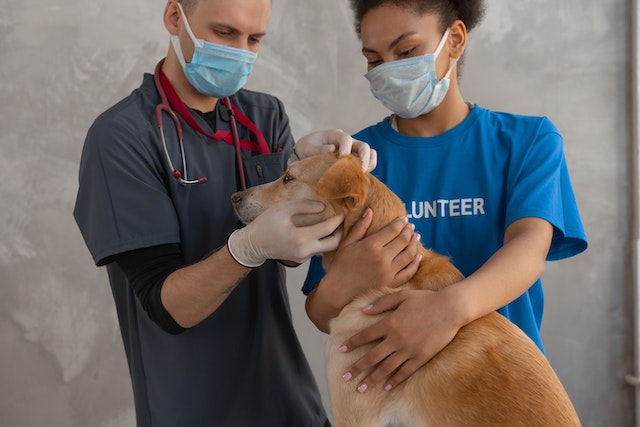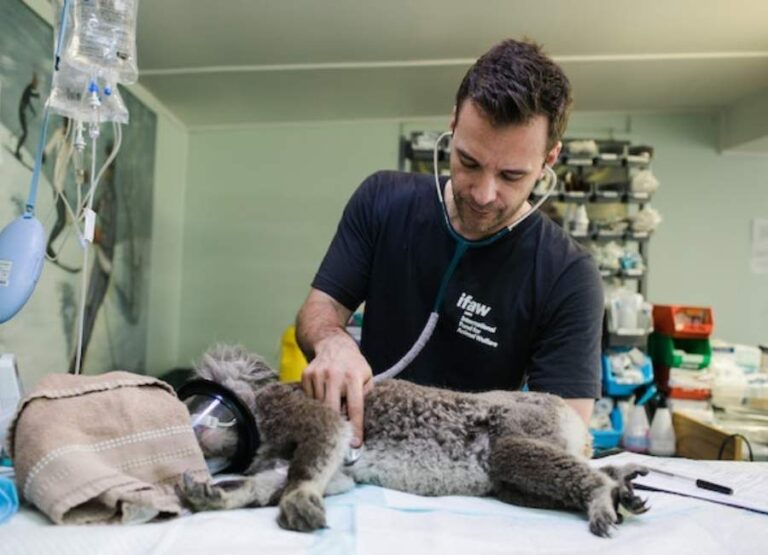11 Most Common Beagle Sick Symptoms

If you’re a dog owner, you know that your pup is a beloved member of the family. When your sweet Beagle falls ill, it can be tough to know just what to do to make them feel better.
In this post, we’ll explore some common Beagle sick symptoms, so you can be prepared and keep your furry friend as healthy as possible.
Whether you’re a seasoned Beagle owner or a new puppy parent, read on to learn what to look out for when your Beagle is feeling under the weather.
Beagle Sick Symptoms
Some common symptoms of illness in Beagles include changes in appetite or weight, vomiting, diarrhea, coughing, hair loss, difficulty breathing, bloated abdomen, heavy panting, loss of consciousness, or involuntary body movements.
However, these symptoms could be indicative of different illnesses; hence it is recommended to seek veterinary help if you notice any unusual signs or persistent changes in your dog’s health.
Let’s break it down…
Common Beagle Sick Symptoms
The following are some of the most causes of Beagle sick symptoms:
1. Vomiting and Diarrhea
Vomiting and diarrhea are common symptoms of various underlying disease conditions in beagles. These symptoms often occur together and can be a sign of a more serious health issue.
The causes of vomiting and diarrhea in beagles can vary and include gastrointestinal issues, infections, poisoning, and allergies.
To identify the cause of these symptoms in your beagle, your veterinarian will perform a thorough physical exam and may recommend additional diagnostic tests, such as blood work and radiographs.
Treatment for vomiting and diarrhea in beagles will depend on the underlying cause of the symptoms. It may include fluid therapy to prevent dehydration, medication to reduce nausea or inflammation in the digestive tract, and a special diet to ease digestion.
Prevention of vomiting and diarrhea in beagles can be achieved through proper nutrition, exercise, and regular vet visits. Beagle owners should also keep their dogs away from potential toxins, such as certain foods, cleaning products, and plants, and avoid sudden changes in their diet or routine.
If you notice your beagle experiencing vomiting and diarrhea, it is important to seek veterinary care promptly to help ensure a swift and complete recovery.
2. Lethargy or weakness
Lethargy is a common symptom in beagles that may indicate an underlying health issue. It is characterized by a lack of energy or enthusiasm and a tendency to sleep for extended periods.
Causes of lethargy in beagles may include dehydration, infections, cancer, and vaccination reactions. Treatment of lethargy involves addressing the underlying cause of the symptom.
For example, providing a beagle with adequate fluids and electrolytes can help alleviate dehydration. Infections may require antibiotics, while cancer may require chemotherapy or radiation therapy.
Prevention of lethargy in beagles involves proper nutrition, regular exercise, and routine veterinary care to catch any underlying health issues early before they become more serious.
3. Excessive thirst and urination
Excessive thirst and excessive urination are common symptoms in beagles that may indicate an underlying health problem.
Beagles who are experiencing excessive thirst may drink more water than usual and may even beg for water or lick water from unusual places.
Excessive urination may lead to accidents in the house, as well as frequent trips outside.
Some of the common causes of excessive thirst and urination in beagles include diabetes, Cushing’s disease, kidney disease, and certain medications.
Treatment for these conditions generally involves management of the underlying issue, as well as administration of medication and dietary changes.
Prevention involves maintaining a healthy lifestyle for your beagle and regular checkups with a veterinarian to catch any potential health issues early on.
If you suspect your beagle is suffering from excessive thirst and urination, it’s best to consult with your veterinarian to determine the underlying cause and appropriate treatment.
4. Loss of appetite
Loss of appetite is a common symptom in beagles and can indicate a number of underlying issues.
There are several reasons why a beagle may lose its appetite, such as anorexia due to a behavioral condition or disease, illness, decreased nutritional requirements, dehydration, and anemia.
If your beagle is experiencing loss of appetite, it is important to consult with a veterinarian to determine the underlying cause.
The vet may conduct a physical exam, run some blood tests, or perform imaging studies to determine the cause of the loss of appetite.
Treatment of loss of appetite will depend on the underlying cause. For instance, if the cause is dehydration, the veterinarian may recommend the administration of intravenous fluids to rehydrate the dog.
In cases of more serious illnesses like cancer, the veterinarian may recommend more aggressive treatments like chemotherapy or surgery.
5. Difficulty breathing and Abnormal panting
Difficulty breathing and abnormal panting are common symptoms of sick Beagles and can be caused by several underlying medical conditions.
One of the most common causes of these symptoms is Congestive Heart Failure (CHF), which occurs when the heart is unable to pump blood effectively, leading to fluid accumulation in the lungs.
Other possible underlying causes include respiratory infections, allergies, or lung diseases such as chronic bronchitis.
Treatment for difficulty breathing and abnormal panting in Beagles depends on the underlying cause and may include medications to manage heart failure, antibiotics if the infection is the cause, or steroids to manage allergies.
It is important to seek veterinary care immediately if a Beagle is having difficulty breathing or abnormal panting to prevent complications and ensure timely treatment.
6. Runny nose
Beagles are known to have a higher chance of developing certain health issues, including ear infections, allergies, and respiratory problems.
A runny nose in beagles can be a common symptom of various health issues, such as infections, allergies, foreign objects stuck in the nasal passage, tumors, or even dental problems.
The most common cause of a runny nose in beagles is allergies, which can be caused by various environmental factors or food.
Treatment for runny noses in beagles depends on the underlying cause and may involve medications such as antibiotics, antihistamines, or steroids.
Your veterinarian will be able to diagnose the cause of the runny nose and recommend the appropriate treatment plan.
It is important to seek veterinary care if your beagle is showing signs of illness or discomfort, as prompt treatment can help prevent further health complications.
7. Swollen joints
Swollen joints can be a common symptom in Beagles, and can be caused by a variety of conditions.
One possible cause of swollen joints is arthritis, which is a degenerative joint disease that can cause pain, stiffness, and swelling in the joints.
Another possible cause of swollen joints is infection, such as Lyme disease or bacterial infections. It is also possible for swelling in the joints to be a symptom of a more serious condition, such as cancer.
Treatment will depend on the underlying cause of the swelling but may include medications to reduce inflammation and pain, physical therapy, or surgery in some cases.
It is important to seek veterinary care if your Beagle is displaying symptoms of swollen joints, as prompt treatment can improve their quality of life and prevent further complications.
8. Coughing
Coughing in beagles is a common symptom of an illness that can indicate a range of underlying conditions.
Some possible causes of coughing in beagles include respiratory infections, heart disease, intervertebral disc disease, brucellosis, and dehydration.
Treatment for coughing in beagles will depend on the underlying cause and may include antibiotic or antiviral medications, anti-inflammatory drugs, rest, and fluid therapy.
It is important to consult with a veterinarian if you notice your beagle coughing, as it can be a sign of a serious condition that requires prompt treatment.
Regular check-ups can also help detect any potential health issues before they become more serious.
9. Persistent itching or scratching
Persistent itching or scratching in beagles is a common symptom of several health issues, including allergies, parasitic infestations, skin infections, and autoimmune diseases.
Environmental and food allergies are the most common causes of pruritus, or itchiness, in dogs, including beagles.
Other possible causes include yeast or bacterial infections, hormonal imbalances, and skin cancer.
Treatment for persistent itching or scratching in beagles depends on the underlying cause.
For example, antihistamines, corticosteroids, or immune-modulating drugs may be used to treat allergies, while medicated shampoos or antibiotics may be used to treat bacterial or yeast infections.
It is important to seek veterinary advice if a beagle is experiencing persistent itching or scratching to determine the underlying cause and appropriate treatment.
10. Sudden weight loss or gain
Sudden weight loss or gain in beagles can be a sign of an underlying health issue and should be discussed with a veterinarian.
Some common causes of weight loss in beagles include anorexia (lack of appetite) due to a behavioral condition or disease, cancer, and hypoglycemia.
On the other hand, weight gain can be caused by overeating or an underlying medical condition, such as Cushing’s disease.
Treatment options will vary depending on the underlying cause of the weight change and may include changes in diet, medication, or other medical interventions.
If you notice sudden weight loss or gain in your beagle, it is important to consult with a veterinarian for proper diagnosis and treatment.
11. Seizures or convulsions
Seizures or convulsions in beagles can be a relatively common symptom of various underlying health issues.
Some of the most common causes of seizures in beagles include hypoglycemia, meningitis, brain tumors, and liver disease.
Other possible causes can include genetics, environmental factors, or unknown factors.
Treatment for seizures in beagles will largely depend on the underlying cause of the seizures.
In some cases, medications such as anticonvulsants may be prescribed to help manage the seizures.
Additionally, the underlying health condition will need to be assessed and treated accordingly.
It is important to note that if your beagle experiences a seizure, you should seek veterinary care as soon as possible.
Your veterinarian will be able to diagnose the underlying cause of the seizure and establish a course of treatment to help manage your beagle’s condition and provide the best possible outcome.
Learn more about some common health problems in beagles.
Related questions
What are some common signs that my Beagle is sick?
Some common signs that your Beagle may be sick include lethargy, loss of appetite, vomiting, diarrhea, coughing, sneezing, and a runny nose. If you notice any of these symptoms, it’s important to take your Beagle to the vet right away to get a proper diagnosis and treatment.
Can Beagles get allergies or skin problems?
Yes, Beagles can certainly get allergies or develop skin problems. Some common signs of allergies in dogs include itching, scratching, chewing or licking at the skin, red or inflamed skin, and ear infections. If you notice any of these symptoms, it’s important to take your Beagle to the vet right away for proper diagnosis and treatment.
What should I do if my Beagle has diarrhea or is vomiting?
If your Beagle has diarrhea or is vomiting, it’s important to make sure they stay hydrated by providing plenty of clean water. You may also want to switch to a bland diet of boiled chicken and rice until the beagle’s stomach settles down. If diarrhea or vomiting persists for more than a day or two, it’s important to take your Beagle to the vet for further evaluation.
How can I prevent my Beagle from getting sick?
To help prevent your Beagle from getting sick, make sure they get regular checkups and vaccinations from their veterinarian, feed them a nutritious diet, provide plenty of exercise and playtime, regularly brush their teeth and coat, and keep their living environment clean and free of hazards.
Can Beagles get respiratory infections?
Yes, like any other dog breed, Beagles can get respiratory infections such as kennel cough or pneumonia. Some signs of respiratory infections in dogs include coughing, sneezing, runny nose, and fever. If you notice any of these symptoms, it’s important to take your Beagle to the vet right away for proper diagnosis and treatment.
What should I do if I think my Beagle is sick?
If you suspect that your Beagle may be sick, it’s important to take them to the veterinarian as soon as possible for an exam and diagnosis. The earlier you catch and treat an illness or injury, the better the chance of a full recovery. Make sure to monitor your Beagle’s behavior and look out for any signs of illness, and don’t hesitate to seek veterinary care if you notice anything out of the ordinary. It’s always better to be safe than sorry when it comes to the health and well-being of your furry friend.
Learn more about taking care of a beagle.
Conclusion
In conclusion, keeping a close eye on your beagle’s health and behavior can help you catch any potential health issues early on.
Always be on the lookout for symptoms such as lethargy, loss of appetite, and vomiting, and consult with your veterinarian if you notice any concerning changes.
Remember, taking proactive steps to keep your furry friend healthy is the key to a happy and long-lasting relationship with your beloved beagle.

![Ear Infections in Dogs [Signs, Causes & More] Ear Infections in Dogs](https://petcreeks.com/wp-content/uploads/2023/09/pexels-mikhail-nilov-7470755.jpg)

![Why Does My Beagle Shake [8 Reasons & Tips] Why Does My Beagle Shake](https://petcreeks.com/wp-content/uploads/2021/04/dog-5206460_640.jpg)


